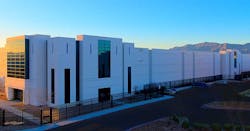Peak 10 has become Flexential, adopting a new name and brand following its $1.7 billion acquisition of ViaWest. After a period of operating as Peak 10 + ViaWest, CEO Chris Downie says the rebranding allows Flexential to build a new identity for the national data center company formed through the merger.
“One of the first questions out of the gate was ‘what is the new name going to be,'” said Downie. “We’re not looking to throw away the legacy of the brands. The combination of Peak 10 and ViaWest gave us a new, unique position in the marketplace, and we felt it important to create a new brand to reflect that position.”
The new name reflects big ambitions for Flexential, which is backed by private equity firm GI Partners, an experienced investor in the data center industry. Peak 10 targeted second-tier markets in the Southeast, while ViaWest built a similar network in the Western U.S. The merger of the two firms created a national footprint of 41 data centers in 21 cities, with more than 3 million square feet of IT space.
Downie says Flexential will seek to continue its expansion, considering additional acquisition opportunities, and deals that will allow the company to compete in the industry’s largest markets.
What Is Flexential?
So what does Flexential mean? “It’s a new word, obviously,” said Downie. “We think it will help us stand out in the market.” The name is intended to suggest several qualities embodied by the combined company, including flexible, essential and exceptional.
The company will seek to build its brand around Flexential’s brand manifesto: The power of people in a technical world.
“As Flexential, our two companies come together to stand for something unique in the world of IT transformation: the human touch,” said Downie. “We strongly feel that the best infrastructure solutions are about people. They power our business and give us the opportunity to serve our customers no matter how technology changes.”
The new Flexential logo.
Rebranding experts have been busy in the data center industry over the past year, with several investor-backed companies taking on new identities after acquiring properties. That includes Cyxtera, which was formed by Medina Capital and BC Partners after buying 57 data centers from CenturyLink. Another example is Element Critical, created by Safanad and Industry Capital to serve as a platform for its data center holdings, including the former Central Colo and Tyson Technology Center.
As part of its brand brainstorming, Peak 10 considered more than 100 names, and tested 17 contenders in interviews more than 700 buyers and customers. More than 20 logos were reviewed during the process.
Growth Within Customer Base
The rebranding creates an opportunity for Flexential to define itself in a competitive marketplace. The first step is communicating the vision to the company’s 4,200 customers. Downie noted that 65 to 70 percent of new business comes from existing customers. “We really feel that we’ve got opportunity in our existing customer base,” he said.
Flexential is focused on the hybrid IT opportunity, offering data center solutions spanning colocation, connectivity, cloud, managed solutions and professional services. With its network of data centers in second-tier markets, the company also sees opportunity in edge computing, which shifts dynamic content closer to users. Flexential It is currently continuing its integration of the Peak 10 and ViaWest operations, which will occur over 18 months.
The company also continues to expand its portfolio. In November it acquired a data center in Collegeville, Pa. from pharmaceutical giant GlaxoSmithKline plc. The 203,000 square foot data center sits on 25 acres of property, providing room for expansion. The deal was a sale-leaseback transaction, in which an enterprise company sells its data center to a third-party, and then leases the space it needs to operate its existing IT facilities.
“That was a great opportunity because GSK had invested in that facility, and there’s land,” said Downie. “We had a high-quality, enterprise-class facility. That’s probably a rare opportunity.”
Flexential now has more than 3 million square feet of IT space, but Downie says the company will continue to look for opportunities to expand.
“Scale matters, and this new platform affords us a way to pursue that scale,” he said. “We’re very focused on continuing to expand. The industry consolidation continues, and we’ll be opportunistic as we look at those deals. We’re very focused on continuing to expand.”
With a national network of data centers in second-tier markets, Downie says Flexential may look for opportunities in Tier One markets where it has no footprint, including places like Chicago, New York/New Jersey and California.
“There’s clearly Tier 1 markets that we’d like to be in,” said Downi.e “Those would be logical extensions for our growth.”
About the Author



